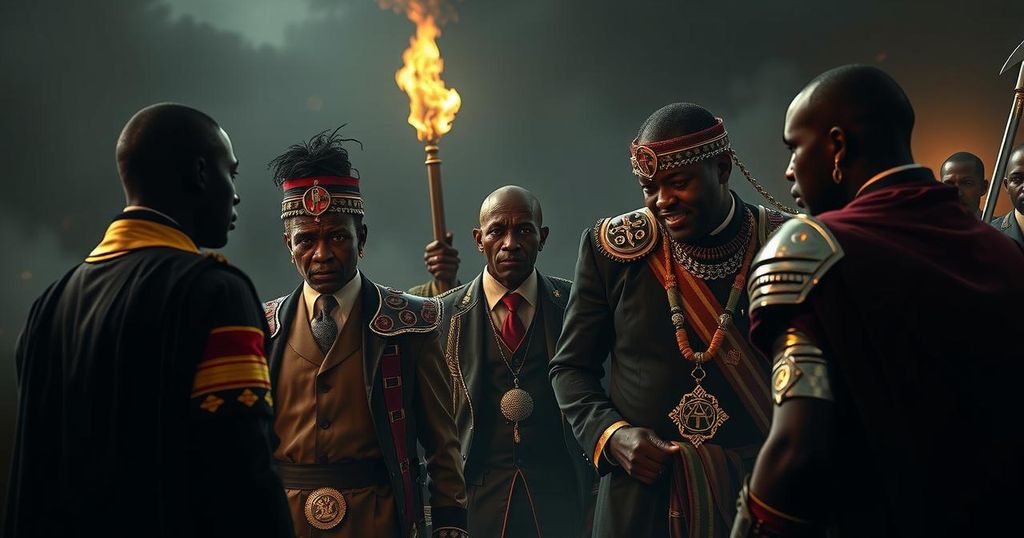Politics
’ HAYSOM, AFRICA, CONFLICT RESOLUTION, CORRUPTION, DEMOCRACY, EUROPE, HUMANITARIAN ASSISTANCE, ISS, JOINT MONITORING AND EVALUATION COMMISSION, KI, KIIR, NICHOLAS HAYSOM, NORTH AMERICA, NORWAY, PETER FABRICIUS, RECONSTITUTED JOINT MONITORING AND EVALUATION COMMISSION, REVITALISED TRANSITIONAL GOVERNMENT OF NATIONAL UNITY, RTGONU, SOUTH SUDAN, TR, TRANSITIONAL GOVERNMENT, TRANSITIONAL GOVERNMENT OF NATIONAL UNITY, UN, UN MISSION IN SOUTH SUDAN, UNITED KINGDOM, UNITED NATIONS SECURITY COUNCIL, UNITED STATES, UNMISS
Jamal Walker
0 Comments
Political Stagnation in South Sudan: Election Postponement Raises Concerns
South Sudan’s electoral process has been postponed to December 2026 due to inadequate preparations and an unwillingness among leaders to transition to elections. President Kiir and Vice-President Machar maintain power through the transitional government, prioritizing political maneuvering over democratic legitimacy. The international community expresses disappointment as the nation faces challenges in implementing the 2018 peace agreement and navigating a fragile political landscape exacerbated by regional instability.
The ongoing political crisis in South Sudan underscores a stagnation in the democratic transition of the nation since its independence. Following the fourth extension of the electoral process, the recent postponement of elections to December 2026 has been driven by a lack of substantive preparations and political will among key leaders. President Salva Kiir and Vice-President Riek Machar exhibit a disinterest in moving towards elections as their positions in the transitional government allow them to retain power without electoral legitimacy.
The international community has displayed disappointment at the continued delays, with support from the United States, the United Kingdom, and Norway highlighting the leaders’ reluctance to prioritize citizens’ welfare over political interests. Efforts to implement the 2018 peace agreement have also been hindered by challenges such as insufficient political will and trust deficits, further diminishing the chances for timely elections. Major General Charles Tai Gituai indicated that the Revitalised Transitional Government of National Unity (RTGoNU) must demonstrate new levels of commitment to resource mobilization for the peace deal’s enactment.
Nicholas Haysom, the UN Special Representative, acknowledged the delays as both inevitable and regrettable, asserting that serious compromises are essential for meeting the new election deadline. To facilitate a successful electoral process, he proposed several immediate actions, including the establishment of necessary armed forces and improvements in civic and political participation. Yet, fears remain regarding the feasibility of completing the constitutional and census preparations in time for elections.
Furthermore, the civil unrest in neighboring Sudan exacerbates South Sudan’s difficulties, particularly its revenue-generation challenges due to disrupted oil exports. Proposals for a neutral caretaker government have surfaced, albeit with the acknowledgment that political consensus among leaders is critical for any progress. South Sudan’s political leaders seem more likely to strategize around power-sharing rather than pursue a democratic electoral process, thereby undermining any prospect of timely elections.
Despite intermittent conflicts, South Sudan has not yet reverted to civil war, yet the peace remains precarious. The internal dynamics suggest an ongoing struggle between the need for democratic legitimacy and entrenched power interests, making the 2026 elections a complex and potentially unfulfilled promise.
South Sudan, recognized as the youngest nation in Africa following its independence in 2011, has faced continuous political strife that hampers its transition to democracy. The country has experienced prolonged tensions between rival factions, particularly between President Salva Kiir and Vice-President Riek Machar, which have stifled political progress and governance. The repeated extensions of planned elections highlight the systemic issues within its political framework, characterized by a failure to implement the 2018 peace agreement. The postponement of elections reflects not only a lack of preparedness but a conscious choice by leading figures to maintain their hold on power, further complicating the nation’s path to democratic governance.
In conclusion, the political landscape in South Sudan remains mired in disarray and apprehension regarding the forthcoming elections. The postponement to 2026 presents significant challenges, primarily attributed to the disinterest of political leaders in fostering genuine democratic processes. The international community’s disappointment and calls for action reiterate the need for serious compromises and reforms. As South Sudan continues to navigate through economic and political instability, the hopes for a successful transition to democracy hinge on overcoming entrenched political interests and mobilizing sufficient resources for the critical electoral preparations.
Original Source: www.eurasiareview.com




Post Comment